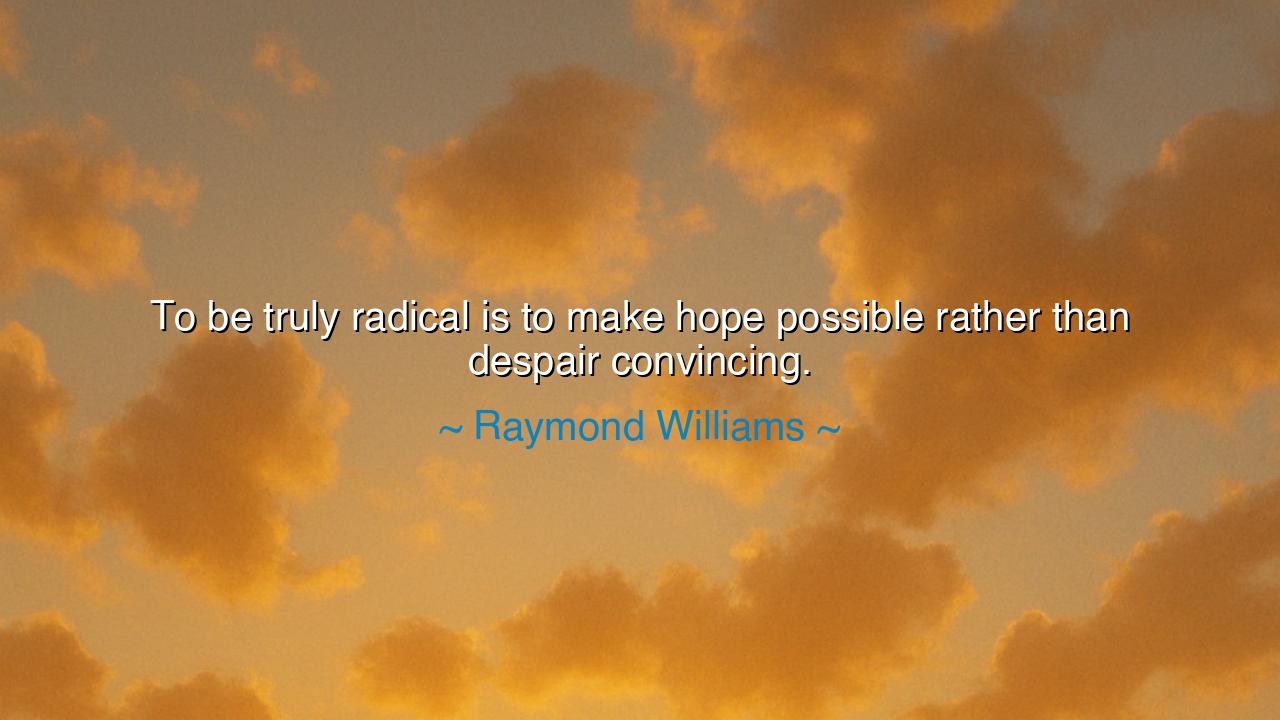
To be truly radical is to make hope possible rather than despair






In the profound words of Raymond Williams, the thinker who gave voice to the conscience of modern culture, we hear an eternal summons to courage and creation: “To be truly radical is to make hope possible rather than despair convincing.” These are not the words of a dreamer blind to the world’s wounds, but of a seer who understood that true transformation does not spring from anger alone, but from faith in renewal. Williams, a son of Wales and of working people, lived through wars, divisions, and disillusionment. Yet in the midst of this, he declared that the true radical — the one who changes the course of history — is not the one who glorifies destruction, but the one who plants seeds of hope in the scorched earth of despair.
To understand his wisdom, one must first see the trap of despair. Many who call themselves radicals — in politics, art, or spirit — fall prey to bitterness. They believe that to expose injustice, one must drown the world in the language of ruin. Yet despair, though it may feel truthful, paralyzes the soul. It convinces the heart that nothing can be done, that darkness is destiny. Hope, by contrast, is the most revolutionary force of all, for it dares to imagine what does not yet exist. It is not naïve; it is defiant. It is the fire that whispers, even in ruin, “The story is not over.” Williams teaches us that the radical spirit is not the one who tears down alone, but the one who builds amid the rubble — who makes possible what cynicism says cannot be done.
History offers us countless examples of this truth. Consider Mahatma Gandhi, who stood before the British Empire, armed not with armies but with hope — the belief that moral truth could bend the will of the powerful. Many called him foolish, too gentle for revolution, too trusting of human conscience. Yet his hope proved more dangerous to tyranny than despair ever could. His movement stirred not fear, but faith — faith that justice could be won without hatred, that the soul of a people could awaken without blood. In this way, Gandhi embodied Williams’s vision: to be radical is to give the world something to live for, not merely something to destroy.
The same spirit burned in Martin Luther King Jr., who faced the hatred of segregation with the words, “I have a dream.” He could have spoken only of pain and anger, and no one would have blamed him. Yet he chose to speak of hope — of children walking hand in hand, of justice rolling down like waters. His dream was not weakness, but strength — the strength to lift millions from despair into belief. King understood, as Williams did, that despair convinces the mind but poisons the will, while hope, though fragile, mobilizes the heart. The true radical is the one who refuses to surrender the possibility of light.
Hope, then, is not a sentiment, but a discipline — a craft of vision and endurance. It must be forged daily against the grinding weight of reality. It is not blind to suffering; it works through it. Hope sees the cruelty of the world clearly, yet answers it not with surrender but with creation. To “make hope possible,” as Williams says, is to speak words and build actions that allow others to glimpse another future — a future where goodness is not fantasy but potential. This is the radical act: to remind humanity that even in its brokenness, it still holds the power to heal.
Despair, by contrast, is the easier path. It demands no labor, no faith, no imagination. It whispers that the world cannot change, that injustice is eternal, that love is foolish. It makes itself convincing, for it borrows its power from truth twisted into fatalism. Yet those who choose despair become its instruments — they paralyze the very movements they begin. Williams’s warning is timeless: to be truly radical is not to curse the world for its sins, but to reclaim it for its possibilities. To make hope possible is to resist the seduction of hopelessness — to build when others abandon, to speak life where others speak death.
Let this be the lesson for those who seek to change the world, or even their own hearts: do not become merchants of despair. Make hope possible. When you see injustice, act — not out of hatred, but out of the belief that goodness can prevail. When you find others weary of the fight, lend them courage. When your own heart falters, remember that hope is not a passive wish, but a force that must be practiced like any art. Speak words that kindle vision, not cynicism; build things that endure; teach others to imagine. Hope does not wait for the dawn — it creates it.
And so, my children, remember the wisdom of Raymond Williams: the truest revolution is not waged with fury, but with faith. The world will always have its prophets of despair — those who find power in ruin. Be instead a craftsman of hope, a builder of beginnings. For when all else fails, hope remains the one thing that can summon humanity back to itself. To make hope possible is to keep the future alive — and that, indeed, is the most radical act of all.






AAdministratorAdministrator
Welcome, honored guests. Please leave a comment, we will respond soon